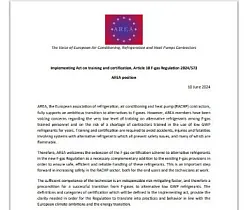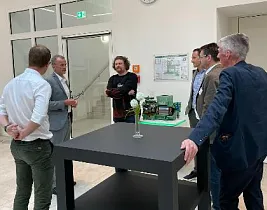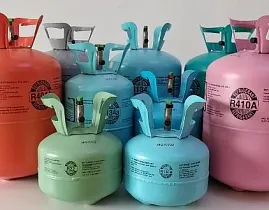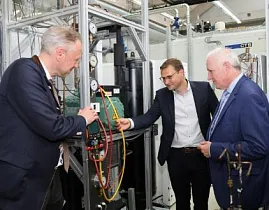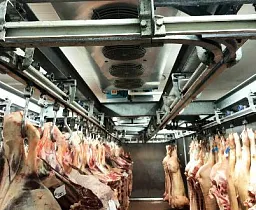In Spain, more than 4.6 million tons of CO2 equivalent of HFCs have been introduced - refrigerant gases used in refrigeration systems and in air conditioners in the automotive industry, hospitals or supermarkets, among others - illegally during 2018 and 2019. A figure that places the country as the largest importer of illegal refrigerant gases in Europe.
These are some of the figures that Diego García, CEO of Kimikal -representing AEFYT, the Association of Cold Companies and their Technologies- reveals in the webinar held yesterday, organized by the European Fluorocarbon Technical Committee (EFCTC, by its acronym in English) and AEFYT, and aimed at the refrigeration and air conditioning industry.
Given the high Atmospheric Warming Potential (GWP) of HFC refrigerant gases, in 2015 the F-Gas regulation came into force, the purpose of which is to combat climate change with the gradual elimination of HFCs. The objective at the European level is to reduce 79% of its consumption in 2030, compared to the levels of 2009-2012. Likewise, the regulation was created with the purpose of stimulating the development of alternative solutions and guaranteeing fair competition between the key sectors of the economy. This has meant for the industry the gradual reduction of imports of HFC greenhouse gases through a quota system -which applies to all access points to the EU, with the aim of controlling the entry of fluorinated gases into the European market-. However, it is in this context where the black market for HFCs arises that aims to circumvent this regulation.
In Spain, the entry into force of the F-Gas was accompanied by a tax on Fluorinated Gases that came into force the previous year, in 2014, and which has been an added aggravation for illegal trade in the country. As Diego García, CEO of Kimikal and member of AEFYT explains in the webinar, “the truth is that, in Spain, since the Fluorinated Gas tax and the F-Gas regulation came into force, we have not perceived the impact positive of the reduction of imports required by this regulation through the use of quotas. On the other hand, we have observed the irruption of a suspicious massive offer of products with reduced prices from other distributors ”.
Lack of control, low penalties, and discrepancies between member states regarding the fines to be imposed have facilitated non-compliance with regulation and tax evasion by criminal organizations, introducing quota-free HFCs in Europe. In fact, "in Spain it is estimated that the Tax Agency has stopped collecting around 50 million euros, as the tax on Fluorinated Gases has been evaded," adds García.
All of this has given rise to a black market with a very significant size at the European level. According to the investigation carried out by the consulting firm Oxera and the analysis of the findings by the EFCTC, the illegal trade of this type of gases could represent up to 34 million tons of CO2 equivalent, that is, around 33% of the allowed legal market, in the European Union, in 2018. This would be equivalent to incorporating 25 million new cars on European roads - more than the total number of cars in use in Spain in 2018.
It is foreseeable that the size of this black market could increase with the new quota reduction in 2021 if measures are not taken to stop it. And this would have the consequent impact on the EU's environmental objectives. As Murli Sukhwani, EMEA FluoroChemicals Managing Director at Chemours and President of EFCTC data explains, “The total HFC share will be reduced again in 2021 with the aim of facilitating the transition to low-GWP refrigerants, but this could cause the shortage of HFC gases and, consequently, the increase in the import and trade of illegal gases ”. The illegal trade in HFCs also has an economic impact on companies throughout the value chain and finances organized crime, so such an increase “could affect the entire market, including small and medium-sized companies, which due to the black market of HFCs have already lost around 80% of their business, ”says Sukhwani.
The cooperation of the entire value chain, necessary to stop illegal trade
Given the evidence of this problem, the EFCTC and AEFYT insist on raising awareness among all industry players and collaborating with the authorities to eradicate the black market for HFCs. Along the same lines, the EFCTC has urged the industry to contribute by signing its commitment to the fight against the illegal trade in HFCs, which has already been joined by more than 270 organizations and individuals across Europe. In addition, the EFCTC invests in investigations into the problem and calls on all those involved in the sector to report any suspicious activity they have detected through an anonymous reporting channel, managed by an independent entity.
AEFYT, for its part, founded the Environment Observatory in 2010, whose function is to supervise a correct transition of HCFC refrigerants -prohibited in Europe- to HFCs, channel the information received and collaborate with the Administration to enforce the different Regulations and Regulations that affect the Refrigeration sector. In addition, it transfers the complaints received about suspicious activities to the authorities, with which it works closely, offering training to the Nature Protection Service (SEPRONA) and the Customs Surveillance Service.
Join the commitment for free:
https://stopillegalcooling.eu/es/pledge/.
To report any suspicious activity, access the
EFCTC Report Line.
